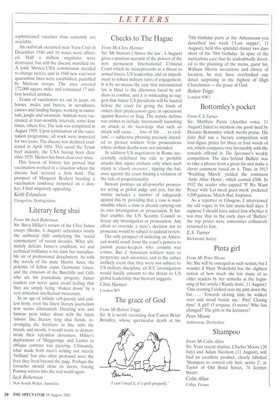Checks to The Hague
From Ms Chris Harmer Sir: Mr Stewart (Above the law', 4 August) gives a spurious account of the powers of the new permanent International Criminal Court which he misrepresents as a threat to armed forces, US leadership, and an impediment to robust military rules of engagement. It is by no means the case that international law is blind to the dilemmas faced by soldiers in combat, and it is misleading to suggest that future US presidents will be hauled before the court for giving the kinds of orders their predecessors gave in operations against Kosovo or Iraq. The statute defines war crimes to include 'intentionally launching an attack in the knowledge that such an attack will cause . . . loss of life . . . to civilians' — subjective phrasing precisely intended to protect soldiers from prosecutions where civilian deaths were not intended.
In addition US negotiators in Rome successfully redefined the rule to prohibit attacks that injure civilians only when such injury is 'clearly excessive', tipping the balance against the court finding a violation of the rule of proportionality.
Stewart portrays an all-powerful prosecutor acting as global judge and jury, but the statute includes a number of safeguards against this by providing that a case is inadmissible where a state is already carrying out its own investigation or prosecution. It further enables the UN Security Council to freeze any investigation or prosecution. Any effort to override a state's decision not to prosecute would be subject to judicial review.
The only prospect of indicting an American would result from the court's powers to punish peace-keepers who commit war crimes. But if American soldiers were to perpetrate such atrocities, and in the rather unlikely event that they were not subject to US military discipline, an ICC investigation would hardly amount to the threat to US global leadership that Stewart suggests.
Chris Harmer
London W9


























































 Previous page
Previous page